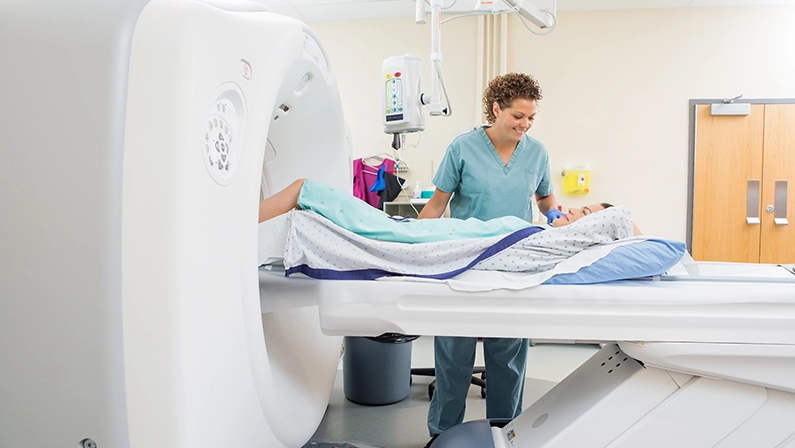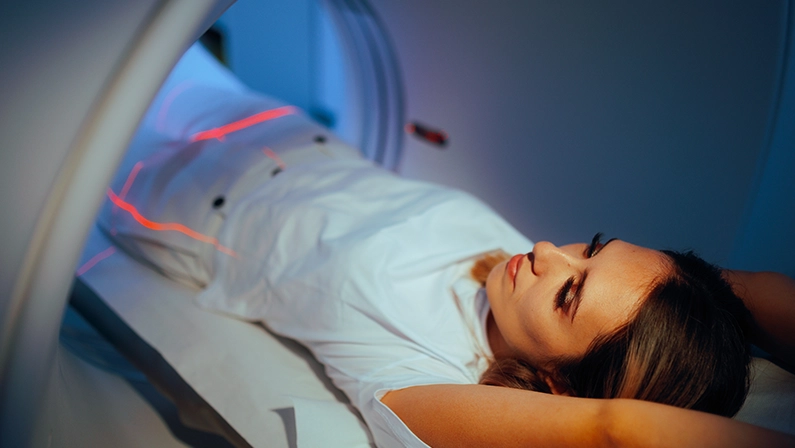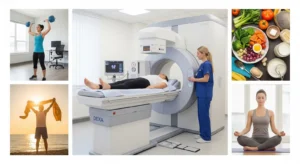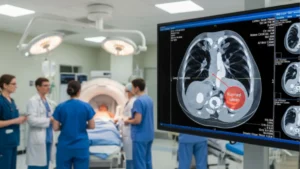Abdominal CT (Computed Tomography) scans have revolutionized the way medical professionals diagnose and monitor issues within the abdominal region. By generating detailed, cross-sectional images of the body’s internal structures, these scans provide valuable insights into the health of key organs. This article will explore the importance of abdominal CT scans, highlight the major organs they visualize, and discuss their various advantages in medical diagnostics.
Importance of Abdominal CT Scans in Medical Diagnostics
Abdominal CT scans are critical tools in modern medicine, allowing healthcare providers to quickly and accurately diagnose a myriad of conditions with minimal discomfort to the patient. Their ability to produce detailed images of internal organs makes them invaluable for identifying issues that may not be detectable with other imaging tests.
What is an Abdominal CT Scan?

An abdominal CT scan employs computer-processed combinations of X-ray measurements taken from different angles to produce cross-sectional images of the abdominal area.
How it works: the process, radiation, and cross-sectional images
During the procedure, the patient lies on a table that slides into the CT scanner. X-rays rotate around the body, producing detailed images of the abdominal organs and structures. These images are then compiled into a comprehensive, multi-dimensional view of the abdominal region.
Major Organs Visualized by an Abdominal CT Scan
The CT Scan advantages offer unparalleled clarity when visualizing various organs, such as liver scan, pancreas imaging, gallbladder stones, kidney abnormalities, intestinal blockages, abdominal blood vessels, abdominal pain diagnosis, and other reasons for CT scan aiding in accurate diagnoses.
Liver
The scan can identify liver abnormalities, such as cysts, tumors, and signs of cirrhosis. It can also detect conditions like fatty liver disease and assess liver damage from infections and chronic conditions.
Pancreas
Pancreatic conditions such as pancreatitis, tumors, or cysts are easily detected through the images produced. It can also help in monitoring the progress or regression of pancreatic diseases.
Gallbladder
Issues like gallstones or inflammation within the gallbladder are visible on a CT scan. It can also identify complications like bile duct obstructions or cholecystitis.
Spleen
A CT scan can reveal splenic enlargement, ruptures, or other structural issues. It is beneficial in diagnosing spleen disorders related to trauma or systemic diseases.
Kidneys
The detailed images assist in detecting kidney stones, tumors, and infections. They can also evaluate congenital abnormalities and the impact of diseases like polycystic kidney disease.
Stomach and Intestines
Conditions such as tumors, blockages, and inflammatory diseases can be precisely diagnosed. It can also detect gastrointestinal bleeding and other abnormalities in the digestive tract.
Blood Vessels and Other Structures Visible in an Abdominal CT Scan
In addition to organs, the CT scan provides images of vascular and other soft tissue structures.
Aorta
An abdominal CT scan can visualize the abdominal aorta, helping detect aneurysms and other vascular conditions. This early detection is crucial for preventing life-threatening events like aortic ruptures.
Lymph Nodes
Enlarged lymph nodes, which may indicate infections or malignancies, are clearly visible. The scan can also help in staging cancers by assessing lymph node involvement.
Other Soft Tissues
The scan also captures detailed images of other soft tissues and connective structures in the abdominal area, such as muscles and fat, aiding in comprehensive diagnosis.
Common Reasons for Getting an Abdominal Imaging CT Scan
Abdominal CT scans are commonly advised for several diagnostic reasons.
Suspected tumors or cancers
Detecting abnormal growths or confirming the presence of cancer. Early detection is vital for effective treatment planning and improved prognosis.
Unexplained abdominal pain
Helping identify the cause of persistent or severe abdominal pain. It can pinpoint conditions like bowel obstructions, ulcers, or vascular issues.
Detection of infections or inflammations
Identifying conditions such as appendicitis or diverticulitis. It helps determine the extent of infection and guide appropriate treatment.
Trauma or injury to abdominal organs
Assessing damage from accidents or injuries. The scan can quickly identify internal bleeding, organ lacerations, or other trauma-related issues.
Pre-surgical evaluation
Providing a comprehensive view to guide surgical planning. It ensures surgeons clearly understand the anatomy and underlying conditions before performing procedures.
Advantages of Abdominal CT Scans

Abdominal CT scans offer numerous benefits that make them a preferred diagnostic tool.
High Accuracy and Detail
CT scans provide highly detailed images that allow for accurate diagnosis and assessment.
Non-invasive
The procedure is non-invasive, avoiding the need for potentially painful or risky surgical exploration.
Fast Results
CT scans can be completed quickly, often within minutes, allowing for rapid diagnosis and treatment.
Comprehensive View of Multiple Organs
The scan provides a comprehensive view of multiple organs and structures in the abdominal cavity.
Detects a Wide Range of Conditions
CT scans are versatile and can detect various conditions, from infections to cancers.
Guides Further Medical Procedures
The information from a CT scan can guide further diagnostic tests and medical procedures, ensuring targeted and effective treatment.
Minimal Preparation Required
Generally, CT scans require minimal preparation, making them convenient for patients.
Widely Available
CT scan technology is widely available in hospitals and diagnostic centers, ensuring accessibility.
Early Detection of Serious Conditions
CT scans play a crucial role in the early detection of severe conditions, improving treatment outcomes and survival rates.
The Vital Role of Abdominal CT Scans in Healthcare

Abdominal CT scans play a critical role in the early detection and accurate diagnosis of various medical conditions, providing invaluable information that guides treatment and improves patient outcomes.
If you are looking for a reliable imaging center, consider One Step Diagnostic for your abdominal CT scan needs. With state-of-the-art technology and experienced professionals, One Step Diagnostic ensures high-quality care and accurate results.
By thoroughly understanding the capabilities and advantages of abdominal CT scans, patients can make more informed decisions regarding their health.



